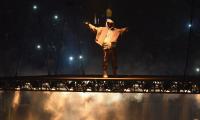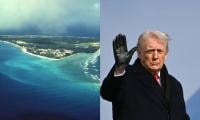Zardari took long time to give his mind on Panama Papers
ISLAMABAD: Former President and Pakistan People’s Party (PPP) chief Asif Ali Zardari took a long time, fifty-five days to be precise, to give his mind on the Panama Papers leaks, with a downright denial of an understanding with the government on these disclosures, writes Tariq Butt.
These disclosures surfaced on April 4. Since then, Zardari has not made even a single remark on the offshore companies as part of a deliberate policy. However, his PPP had been quite active in this connection.
His lingering silence had given rise to widespread speculation that he doesn’t approve the hardline being pursued by some of his party leaders specifically Aitzaz Ahsan on the Panama revelations relating to offshore shells. He has now dispelled all these rumours and told all and sundry that the strategy adopted by them has his nod.
Through his statement, Zardari also rapped Jamiat Ulema-e-Islam-Fazal (JUI-F) chief Maulana Fazlur Rehman, a solid ally of Prime Minister Nawaz Sharif, on the knuckles for his claims to have indirectly worked out a renewed reconciliation between Prime Minister Nawaz Sharif and the PPP head. However, all the time it was conjectured that he met Zardari during his recent visit to London, but he kept vehemently denying it.
Zardari, who has ostensibly distanced himself from the PPP affairs, giving the impression that it has been left to his son Bilawal to run the party, made it clear that the PPP decided to pursue the PanamaLeaks issue to its logical conclusion and there is no question of ignoring the parliamentary committee that has been constituted to prepare the Terms of Reference (ToRs) for the judicial commission.
Zardari’s remarks left no doubt in anybody’s mind that despite staying away from Pakistan for nearly a year now after his bombastic statement against the army generals, he was still the sole decision-maker in the party. He had gone abroad to give a message to the establishment that he will maintain a distance from the national scene.
His assertions explained that the PPP arrived at a well-considered stance on the Panama leaks after due deliberations not only within its own corridors but also with all the political parties. This means that Zardari wants to continue the PPP’s alliance with the opposition forces at least on the issue of probe into the offshore companies for the time being. He believes that the PPP may be able to revive its lost glory by hammering the Nawaz Sharif government on the question of Panama leaks along with other opposition parties.
However, the PPP will be obviously in a fierce competition with the other key player, the Pakistan Tehreek-e-Insaf (PTI), in the opposition grouping, to take mileage out of the present situation if the campaign did produce any benefits for the strange political bedfellows.
Undoubtedly, even the current loose coalition between the PPP and PTI on the Panama leaks can’t be converted into somewhat permanent alliance because their political interests run counter to each other. Both sides budged from their antipathy against each other to forge the present cooperative relationship.
It was the PTI which took the lead in offering olive branch to the PPP when Imran Khan cancelled his scheduled participation in the ‘eliminate corruption, save Pakistan’ movement, spearheaded by Shah Mehmood Qureshi, in Sindh for five days. Also, Qureshi did not say a word during his extensive tour in the interior region of the PPP’s fortress of power on its alleged corruption, which has been no secret.
The “policy of reconciliation” that Zardari now seems to have abandoned was always drum-beaten at a sonorous pitch by the PPP itself for several years, saying that it was devised by Benazir Bhutto that it would always pursue. During its government in 2008-2013, the PPP had benefited the most from this slogan - while being in the opposition although Nawaz Sharif always kept the regime under pressure, yet he never allowed it to fall, and strongly countered any campaign aimed at any unconstitutional intervention and removal of the government.
The real test of the PPP-PTI bonhomie will come when Imran Khan will take to streets in case the bipartisan parliamentary committee failed to finalize the ToRs. He continues to threaten the protest movement. By now, the PPP has followed a clear policy that it would not resort to public protests that may jeopardize the democratic system. The PPP’s contribution in any such protest is unexpected to be any great especially in Punjab where its fortunes are still very low. However, in Sindh it has the capacity to organize huge gatherings.
-
 Kanye West Eyes Performing First-ever Concert In India
Kanye West Eyes Performing First-ever Concert In India -
 Brooklyn Beckham's Claim About Nicola's Wedding Ordeal Gets Challenged
Brooklyn Beckham's Claim About Nicola's Wedding Ordeal Gets Challenged -
 AI Horror: 4 In 5 Young Workers Fear 'AI Could Replace Their Jobs', Says Report
AI Horror: 4 In 5 Young Workers Fear 'AI Could Replace Their Jobs', Says Report -
 Missouri Couple ‘locked Sons In Chicken Pen, Shot Them’ In Shocking Abuse Case
Missouri Couple ‘locked Sons In Chicken Pen, Shot Them’ In Shocking Abuse Case -
 King Charles Receives 'delightful' Royal Baby News
King Charles Receives 'delightful' Royal Baby News -
 Chinese ‘mega Embassy’ Wins UK Approval In London Ahead Of Starmer’s China Visit
Chinese ‘mega Embassy’ Wins UK Approval In London Ahead Of Starmer’s China Visit -
 David Beckham Gives Telling Reaction To Brooklyn’s Public Complaints
David Beckham Gives Telling Reaction To Brooklyn’s Public Complaints -
 Can Ibuprofen Cut Cancer Risks? Study Finds Promising Breakthrough
Can Ibuprofen Cut Cancer Risks? Study Finds Promising Breakthrough -
 Piers Morgan Finally Reacts To Brooklyn Beckham's Statement About David And Victoria Beckham
Piers Morgan Finally Reacts To Brooklyn Beckham's Statement About David And Victoria Beckham -
 Tom Hiddleston Reveals Unlikely DC Character That Inspired Loki
Tom Hiddleston Reveals Unlikely DC Character That Inspired Loki -
 Prince Harry, Meghan Markle Warned 2026 Will Be 'a Big Test' For Them
Prince Harry, Meghan Markle Warned 2026 Will Be 'a Big Test' For Them -
 OpenAI Plans First ChatGPT Device For 2026
OpenAI Plans First ChatGPT Device For 2026 -
 Matt Damon Gets Slammed Over 'out Of Touch' Comparison
Matt Damon Gets Slammed Over 'out Of Touch' Comparison -
 From Chagos Islands To Greenland Trump Flags National Security Risks: Here’s Why
From Chagos Islands To Greenland Trump Flags National Security Risks: Here’s Why -
 Meghan’s UK Return As ‘successful Businesswoman’ Will Put Pressure On Kate Middleton
Meghan’s UK Return As ‘successful Businesswoman’ Will Put Pressure On Kate Middleton -
 Spotify Tests Page Match To Sync Books With Audiobooks
Spotify Tests Page Match To Sync Books With Audiobooks



